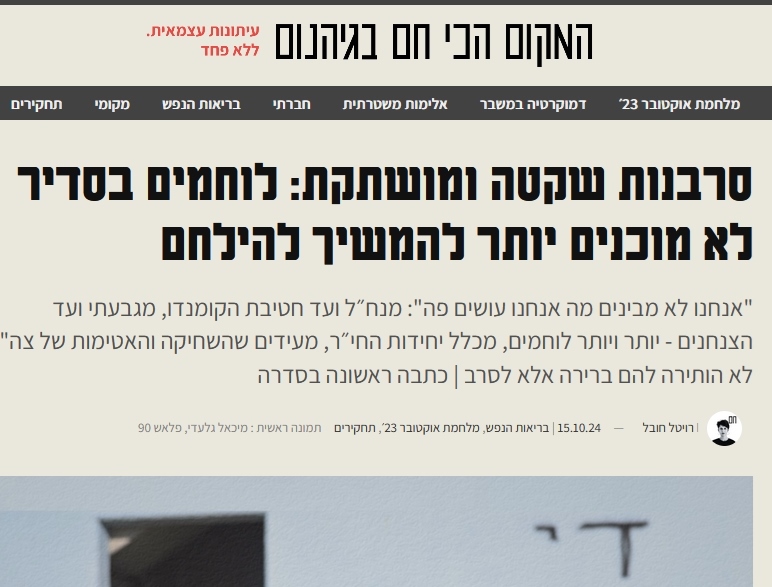A number of Israeli reservists, recently called back to service, are openly rejecting further participation in the occupation’s aggressive war on Gaza. This stance, summarized by several Hebrew newspapers as “they refuse to serve again,” underscores a widening dissent within the ranks of Israel’s reserve forces.
In a recent letter, over 140 reservists declared they would halt their military service until Israeli prisoners are returned from Gaza through a prisoner exchange. Many reservists stated that they have reached “the end of their current service” and are at their “breaking point.” Addressed to Prime Minister Benjamin Netanyahu and Defense Minister Yoav Gallant, the letter stated: “For some of us, the red line has already been crossed, and for others, it is fast approaching: the day we will, with broken hearts, refuse to respond to the call of duty.”
Disillusionment with Israeli Policy
After Israel’s approval of a law in June that temporarily raises the age limit for reservist duty, protests among reservists have intensified. One reservist, Yotam Filk, who voluntarily served for over 230 days with Israeli forces in Gaza, expressed fatigue and a refusal to return if called again. “On October 7, I did not hesitate because our people were being killed, and I felt the urgency to act. But this urgency seems absent from the government’s agenda,” Filk stated.

Filk added that while military action is sometimes justified, it should be a last resort to pave the way for diplomacy. Reflecting on the mounting devastation, he observed, “The destruction in Gaza has become unbearable. Life for Palestinians is harder, and the situation for Israeli hostages has become increasingly desperate.”
“I’ve Had Enough”
Max Krish, an Israeli reservist serving on the Lebanese border since Hamas’s “Al-Aqsa Flood” operation on October 7, expressed disillusionment. “I’ve had enough,” Krish declared, explaining that his experience was tainted by the intense religious fervor he encountered within the ranks. “Many around me were motivated by religious convictions to fight in this war, which felt very uncomfortable,” he shared, adding that one soldier even justified the killing of Palestinian children as a religious duty.
In response, Krish joined others in signing the declaration to suspend their service. Such testimonies reflect the emotional and ideological conflicts now surfacing among Israeli reservists.
The Army’s Response: Discharging Refusing Reservists
In response to these growing refusals, Haaretz reported that the Israeli army has begun to discharge dozens of reservists who insist on halting service until a prisoner exchange agreement is reached. The army contacted reservists who signed the protest letter, notifying them of their removal from active duty.
Lack of Personnel: The Army Turns to Former Reservists and Orthodox Jews
Facing a personnel shortage, the Israeli military recently recalled former reservists who had previously been exempted from service. Defense Minister Gallant ordered the recall of reservists still eligible by age but previously dismissed due to downsizing.
Additionally, a recent attempt to enlist ultra-Orthodox Jewish (Haredi) men has been met with strong opposition. As reported by Channel 12, dozens of Haredi men protested near the Alon military base in northern Israel, clashing with police over forced conscription. Haredim, who make up about 13% of Israel’s population, generally abstain from military service, dedicating their lives to Torah study and viewing secular integration as a threat to their religious identity.
In June, Israel’s Supreme Court mandated Haredi enlistment and halted funding for religious institutions that refuse military service, sparking widespread opposition. This tension exposes the challenges faced by the Israeli military, which is now grappling with a crisis of attrition and reduced morale.
Hamas’s Stance: Total Withdrawal and End of Aggression
While Hamas insists on the complete withdrawal of Israeli forces and an end to hostilities before any agreement, Netanyahu persists in imposing conditions, including control over the Philadelphi Corridor and Rafah border crossing and blocking the return of resistance fighters to northern Gaza. The Israeli government’s refusal to address core demands reveals its entrenched stance, despite mounting resistance and opposition within its own ranks.
Sunna Files Free Newsletter - اشترك في جريدتنا المجانية
Stay updated with our latest reports, news, designs, and more by subscribing to our newsletter! Delivered straight to your inbox twice a month, our newsletter keeps you in the loop with the most important updates from our website












